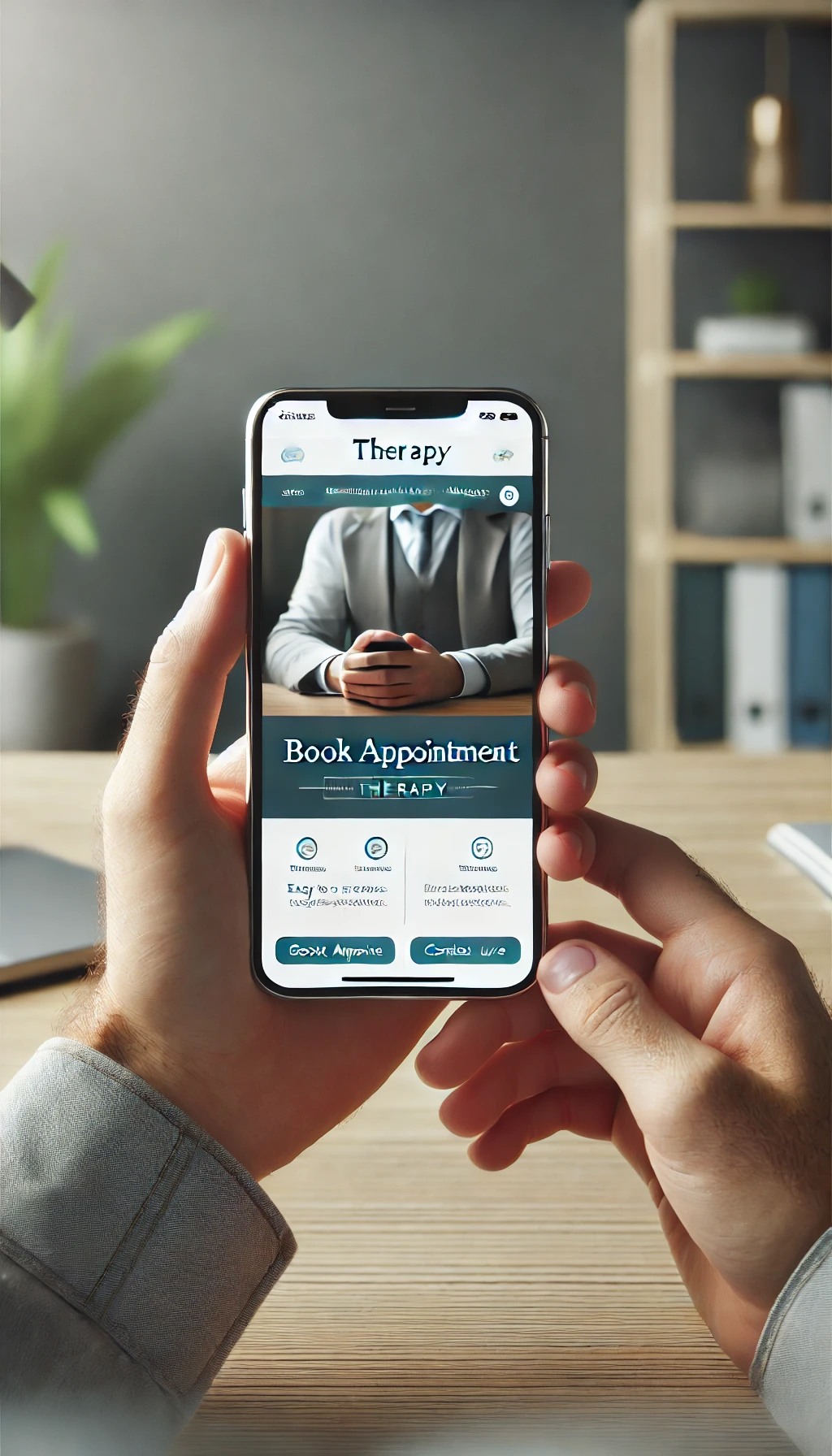Why a Mobile-Friendly Website is Crucial for Your Therapy Practice’s Success
If you’re thinking, “I need a website for my therapy practice,” you’re not alone. Today, more clients search for therapy services online than ever before, and many do so from their phones. Having a website for my therapy practice that’s easy to navigate on mobile is crucial. A mobile-friendly website can enhance user experience, improve SEO, and make it easier for potential clients to connect with you.
A mobile-optimised website for my therapy practice is essential because over 50% of web traffic comes from mobile devices.

In therapy, where establishing trust is key, an outdated or difficult-to-use website can turn potential clients away. A well-designed website for your therapy practice helps bridge the gap between potential clients’ first impression of your services and their decision to seek help.
Why Mobile-Friendly Websites Matter for Therapists
When creating a website for your therapy practice, the most critical factor to consider is mobile responsiveness. Most clients today use their smartphones to search for therapy services. This means your website must look professional and be easy to navigate across all devices.
If potential clients visit your website and find it difficult to use, they may leave and opt for a therapist whose site is more user-friendly. In a profession built on trust, your website must convey professionalism, accessibility, and reliability from the start. This is why having a mobile-optimised website for your therapy practice is crucial.
Key Elements of a Mobile-Friendly Therapy Website:
- Responsive Design: Your website should automatically adjust to fit the screen of any device, ensuring clients can easily browse your services.
- Fast Loading Speed: Slow websites deter visitors. Compress images, optimise your code, and avoid unnecessary features to ensure your website loads quickly on mobile devices.
- Easy Navigation: Clear buttons and menus help guide visitors toward scheduling an appointment or contacting you directly.
- Readable Text: Avoid long paragraphs and use clear, concise language with large, legible fonts.
By focusing on mobile optimisation, you make it easier for potential clients to access your services and information, no matter where they are.
How a Mobile-Friendly Website Improves SEO for Therapists
When clients search for therapy services, you want your website to appear at the top of the search results. Google now uses mobile-first indexing, meaning it primarily uses the mobile version of your website when determining your search engine ranking. If your website is not mobile-optimised, it will rank lower in searches, making it harder for clients to find you.
Mobile SEO Strategies for Therapists:
- Local Keywords: Most people search for therapy services near them. Including location-based keywords, such as “anxiety therapist in [your city]” or “therapy for depression in [your area],” can help your site rank higher for local searches.
- Optimise for Speed: Google favours websites that load quickly. Compressing images and reducing unnecessary code can make your site more mobile-friendly and improve its ranking.
- User-Friendly Structure: Ensure your website’s layout is easy to navigate on mobile. Use headings and subheadings to break up content, making it scannable for mobile users.
- Meta Tags and Descriptions: Use clear, concise meta descriptions that explain your services. This helps search engines and clients understand what your page offers.
By focusing on mobile SEO, you not only improve your ranking on search engines but also make your site more accessible to the clients who need your services.
Converting Visitors into Clients on a Mobile-Friendly Website
A well-designed website for your therapy practice does more than just attract visitors—it turns them into clients. When a potential client lands on your website, they should be able to easily contact you, schedule an appointment, or learn more about your services. The easier it is to navigate your site on a mobile device, the more likely visitors are to engage with you.
Key Factors for Converting Visitors:
- Clear Calls to Action (CTAs): Make it easy for clients to take the next step. Prominent buttons like “Schedule an Appointment” or “Contact Us” should be visible on every page, especially on mobile.
- Simple Contact Forms: Make sure your contact forms are easy to fill out on mobile devices. The fewer fields the user has to fill in, the better.
- Mobile-Friendly Booking System: Clients appreciate the convenience of booking appointments online. Ensure that your booking system is integrated into your mobile site and is easy to use.
- Prominent Contact Information: Your phone number, email, and address should be easily accessible from every page. On mobile, these should be clickable so that users can call or email with a single tap.
By making your mobile website intuitive and easy to navigate, you increase the likelihood of converting a visitor into a client.

Building Trust with a Therapy Website
Building trust is foundational to any therapeutic relationship, and your website is often the first point of contact for potential clients. Ensuring your website is mobile-optimised is crucial for creating a professional and welcoming first impression. Clients want to feel that they can trust you before even meeting you in person, and a well-designed mobile site helps convey this trust by being reliable, easy to navigate, and secure.
User Experience and First Impressions
The first impression your website makes on a potential client can determine whether they choose to explore further or leave. For therapy, where clients seek comfort, care, and professionalism, a mobile-friendly site communicates that you are up-to-date, approachable, and responsive to their needs. If a visitor lands on your site and finds it difficult to navigate, with slow load times or poor formatting on mobile, it might signal to them that you’re not as attentive or reliable as they’d hope.
A seamless, user-friendly mobile experience tells clients you’ve considered their convenience and are prepared to meet them where they are—on their phones. Mobile-optimised websites with quick load times and intuitive navigation reduce frustration, helping potential clients feel at ease as they explore your services.
Consistency Across Devices
Consistency is key to trust-building. Your mobile website should have the same branding, tone, and functionality as your desktop site. This consistency reinforces your professionalism and reliability. A client who visits your site on a mobile device and later returns on a desktop should feel a sense of familiarity and trust in the seamless transition.
Additionally, having a unified experience across platforms reduces the likelihood of confusion, such as differing information or poor functionality on mobile compared to desktop. By maintaining brand and design consistency, you communicate stability and dependability, qualities that are essential in therapy.
Security and Data Protection
When clients are considering therapy, they often seek reassurance that their privacy will be respected. A secure mobile website, especially for the website you build for your therapy practice, signals that your site is safe and trustworthy. Clients who feel their personal data is protected are more likely to trust you with sensitive information.
If your website includes forms for inquiries, appointments, or medical history, ensuring these are mobile-optimised and secure is vital. This builds client confidence, showing their information is handled with care.
Client Reviews and Testimonials
Featuring client testimonials and reviews on your mobile website is another powerful way to build trust. Potential clients often look for reviews as validation of your services. However, displaying these reviews effectively on mobile is key. Reviews that are easy to find, read, and navigate on a mobile device provide social proof, reinforcing that others have trusted you and had positive experiences.
Consider embedding Google reviews or using client testimonials prominently on your homepage. These elements not only build trust but also encourage potential clients to take the next step toward contacting you.
Accessibility and Inclusivity
A mobile-optimised website for my therapy practice also improves accessibility, which builds trust by showing you care about all potential clients, including those with disabilities. Many users rely on mobile devices with assistive technology, such as screen readers or voice commands, to browse the internet. Ensuring your site is fully accessible means that clients with disabilities can still easily navigate your services, fill out contact forms, and book appointments.
Accessibility features, such as clearly labelled images, proper contrast between text and background, and keyboard navigability, make your site more inclusive. By showing that you’ve considered the needs of all clients, you create an environment of care and respect that builds lasting trust.
Maintaining a Personal Connection
A website you build for your therapy practice should reflect the personal, human side of therapy. Including professional yet approachable photos, a warm “About” section, and short videos that introduce you and your services can help humanise your practice. Videos, in particular, are great for building an emotional connection with potential clients before they even meet you. Make sure all media is mobile-optimised to load quickly and work smoothly on smartphones.
The more a client can relate to you as a person, the more trust they’re likely to place in your services. A personal connection built through mobile design can be just as impactful as one made in person.
Why Trust is so Important for Your Therapy Website
Building trust with your clients begins long before the first session. It starts with the moment they visit your website. A mobile-optimised site conveys professionalism, security, and care, ensuring that clients feel comfortable reaching out to you for help. By investing in mobile design that prioritises user experience, consistency, security, and accessibility, you lay a strong foundation for trust, helping potential clients feel confident in choosing your services.
SEO Strategies for Your Therapy Website
When designing a website for your therapy practice, SEO should be a top priority. SEO, or search engine optimisation, ensures that your website is visible to potential clients searching for services. A well-optimised site ranks higher in search results, increasing your chances of being found.
Key SEO Strategies:
- Mobile-First Indexing: Since Google now uses mobile-first indexing, your mobile site needs to be just as robust as your desktop version. Ensure all content, images, and metadata are mobile-optimised.
- Improve Page Speed: Slow-loading websites result in high bounce rates. Use tools like Google’s PageSpeed Insights to check your website’s speed and make necessary improvements.
- Optimise for Local SEO: Include location-specific keywords throughout your site. Clients often search for therapy services near them, so it’s essential to optimise for terms like “therapist in [your city]” or “CBT therapist near me.”
- Schema Markup: Use schema markup to help search engines understand your content better. Implement LocalBusiness Schema and Service Schema to enhance your local SEO performance.
- Optimise for Voice Search: More users are searching for services using voice assistants like Siri or Google Assistant. Optimise for voice search by incorporating conversational keywords like “Where can I find a therapist in [your city]?”
By focusing on these strategies, your website will rank higher in search results, helping you attract more clients to your practice.
The Financial Benefits of a Mobile-Friendly Website
Think of a mobile-friendly website like a well-kept shop on a busy street. When people pass by, they can easily step in and explore without any trouble. This means you don’t have to shout for attention (or spend extra money on ads), because your “shop” already stands out.
Reduced Advertising Costs
When your site is easy to find through searches, it’s like having a clear sign that guides people to your door. You won’t need to keep paying for ads to attract clients. Over time, this is like saving on electricity by using energy-efficient bulbs — a small effort that saves you money in the long run.
Higher Conversion Rates
A mobile-friendly website is like having wide, welcoming doors that invite people in. If it’s easy for visitors to book appointments or reach out for more information, they are much more likely to stay. This is like offering comfy chairs in your waiting room — it just makes the experience better and encourages them to stick around.
For instance, if your contact forms or booking systems are easy to use on mobile, you reduce the barriers to action. Potential clients can quickly fill out forms or schedule an appointment, increasing the likelihood of them committing to therapy services. This higher conversion rate translates directly into more revenue for your practice without requiring extra marketing investments.

Greater Return on Investment (ROI)
Spending money to make your website mobile-friendly is like fixing up an old car. At first, it might seem like an expense, but over time, it pays off because you’ll spend less on repairs (or in this case, ads) and get more mileage out of it. Your site will keep bringing in visitors without needing extra marketing money.
Unlike a static desktop site, a mobile-optimised website brings in more traffic by ranking higher in search results, improving user experience, and ensuring that you capture clients who prefer mobile browsing. Over time, this boosts your practice’s profitability as you gain a steady stream of clients who find you without additional paid marketing.
Long-Term Competitive Advantage
Imagine you’re in a neighbourhood where other shops are old and outdated. But your shop is modern and easy to get into. People are more likely to choose your place over the old-fashioned ones. Having a mobile-optimised website when you build a website for your therapy practice gives you that same advantage over competitors. When potential clients find your site easy to use, they’ll be more likely to pick you over others.
Enhanced Client Retention
Once people like your “shop,” they’ll keep coming back. If your site is easy to use on a phone, clients will find it convenient to book follow-up appointments. It’s like keeping the same inviting setup — they’ll come back because they know it’s a pleasant experience. And happy clients tell their friends, which means you get more customers without spending anything extra.
For example, making it simple for clients to schedule follow-up appointments or access helpful content on their phones ensures they stay engaged with your practice. Client retention is a key factor in maintaining a steady income, and a mobile-friendly site supports this by offering convenience and accessibility to your current clients.
By improving your website’s mobile functionality, you not only enhance client satisfaction and experience but also position your therapy practice for financial success. A mobile-friendly website increases organic traffic, reduces advertising costs, and converts more visitors into clients, making it one of the most cost-effective investments for your practice’s long-term growth.
Why Mobile Optimisation Is Key When You Build a Website for Your Therapy Practice
If you’re planning to build a website for your therapy practice, mobile optimisation should be at the forefront of your strategy. A mobile-friendly website not only improves your SEO but also enhances client trust and increases conversions. As more people search for therapists on their smartphones, ensuring your site is responsive and user-friendly is essential for the success of your practice.
By following these strategies, you can create a website that attracts visitors and converts them into clients, helping your therapy practice thrive in today’s digital world.
However, building and optimising a website for mobile success can be a daunting task without the right expertise. This is where Therapy Marketing comes in. With years of experience helping therapists grow their online presence, we specialise in creating mobile-optimised, professional websites tailored specifically to your therapy practice. From design to SEO optimisation, we handle every aspect to ensure your site stands out, ranks well, and converts visitors into clients. Let us take the guesswork out of building your practice website—so you can focus on what matters most: helping your clients.
